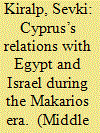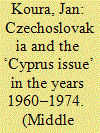| Srl | Item |
| 1 |
ID:
190115


|
|
|
|
|
| Summary/Abstract |
The Makarios era (1960–1977) corresponded with two major regional disputes, with wide implications on international peace and regional politics: the Cyprus issue and the Arab–Israeli conflict. Given that these disputes are still ongoing, this study utilises diverse primary and secondary sources to analyse Cyprus’s relations with Egypt (United Arab Republic) and Israel in the Makarios period, using both political and economic perspectives. The study demonstrates that Cyprus and Egypt’s diplomatic cooperation was built on reciprocal support extended by Nasser towards the Greek Cypriots and Makarios towards Egypt in the Arab–Israeli dispute, especially in international forums such as UN debates. Although Israeli foreign policy did not threaten Cyprus directly, both Cyprus and Egypt considered Turkey a common threat. However, despite the Cypriot government’s pro-Arab stance in the Arab–Israeli conflict, Cyprus had strong relations with both Israel and Egypt concerning the economy, culture, archaeology, medicine, and telecommunications.
|
|
|
|
|
|
|
|
|
|
|
|
|
|
|
|
| 2 |
ID:
183369


|
|
|
|
|
| Summary/Abstract |
This study is based on a broad range of newly declassified documents which garner revelatory findings pertaining to the involvement of Czechoslovakia in the Cyprus dispute in the years 1960–1974. These new findings reveal that the countries of the Eastern Bloc sought to prevent the overthrow of the Cypriot President Makarios during the studied period, as his foreign policy ensured that the island would not become a NATO base against allied Arab countries in the Middle East. Czechoslovakia played a considerable role in keeping Makarios in power by arms deliveries (some of them hitherto unknown), which allowed him to build up the special police forces to counterweight the National Guard controlled by Greece and face attempts of the Greek junta to overthrow him. Additionally, this article analyses activities of Czechoslovak intelligence on the island which managed to obtain valuable information on the politically unstable Eastern Mediterranean and Middle East from the inner circle of President Makarios. Czechoslovak intelligence, contrary to the Ministry of Foreign Affairs, backed weapon sales to Cyprus and supported the island’s non-alignment policy because these guaranteed a steady supply of valuable intelligence on the entire Middle East.
|
|
|
|
|
|
|
|
|
|
|
|
|
|
|
|